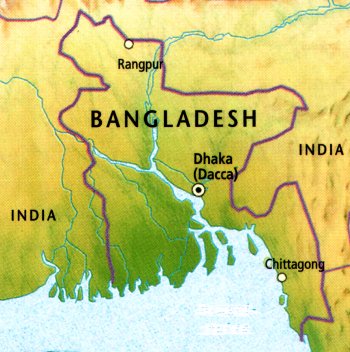Bangladeshi opposition terms Fakhruddin's address "disappointing"
 Dhaka- Leading opposition parties in Bangladesh Tuesday called the nationwide address by the chief of the military-backed interim government "disappointing," as it allegedly did not reflect popular aspiration.
Dhaka- Leading opposition parties in Bangladesh Tuesday called the nationwide address by the chief of the military-backed interim government "disappointing," as it allegedly did not reflect popular aspiration.
The Bangladesh Nationalist Party, the Awami League and the Jatiya Party which had ruled the volatile country at different times however welcomed the lifting of the year-old ban on politics "indoors" ahead of formal talks between a non-partisan regime and prominent opposition groups.
"The national focus is on the state of emergency which must be withdrawn without delay and the holding of the year end general election which is credible," said Awami League presidium member Amir Hussain Amu after a meeting with senior colleagues.
The government Tuesday partially lifted the ban on political activities, allowing limited indoor meetings under emergency rule, which has been relaxed.
In an address to the nation over radio and television chief of the regime Dr Fakhruddin Ahmed also announced plans to hold a crucial general election in the third week of December which is expected to restore democracy in the Muslim country.
"Fakhruddin has not made clear how the government will tackle the political uncertainty facing the country," said Delwar Hossain, a senior member of the Bangladesh Nationalist Party.
Fakhruddin, as the de facto prime minister, decided to hold talks with political parties from May 22 to remove differences on the staging of free national polls.
Both the Awami League and the Nationalists have called on the government to release the two top leaders Sheikh Hasina and Khaleda Zia from prison and cancelling the corruption charges framed against them.
The former central bank governor promised to lift the state of emergency, which restricts human rights, before the parliamentary polls to permit electioneering campaigns.
For a peaceful transition to democracy Fakhruddin urged politicians to strictly abide by the election laws and not indulge in any move encouraging street violence and destruction of government property.
The interim government was appointed by President Iajuddin Ahmad with the support of the army in January 2007 as a bitter standoff between two former premiers Hasina and Zia pushed the South Asian country towards anarchy and escalating violence.
Both leaders, who are at the top of the two most powerful political clans in the country, are now facing corruption charges in special anti-graft courts.
Fakhruddin declared that he would put stress on measures to keep the vote free and credible during his talks with political parties.
The interim administration is preparing a national charter that will guide relations among institutions and communities across the country. (dpa)